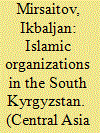|
|
|
Sort Order |
|
|
|
Items / Page
|
|
|
|
|
|
|
| Srl | Item |
| 1 |
ID:
131786


|
|
|
|
|
| Publication |
2014.
|
| Summary/Abstract |
Tablighi Jama'at is one of the most popular Islamic purist movements in the world. Although it has a growing presence in Indonesia, the world's largest Muslim country, little research has thus far been done on its activities in that country. To gain access to Indonesian society, the Tablighi Jama'at has been particularly original in choosing a uniquely Indonesian institution as its entry point: the pesantren (Islamic boarding schools). The role of pesantren for the Tablighis in Indonesia is not confined to spreading Islamic knowledge, they also serve as a hub of Tablighi activities. This paper focuses on examining the role of the Tablighi pesantren in shaping and transmitting religious knowledge to its Indonesian followers, and in particular to female followers, as there is to date no scholarship on this topic. It analyses the life experiences of female Tablighis inside and outside the pesantren and their passion to belong to a global imagined Tablighi community. Transnational travel of female Tablighis from diverse neighbouring countries is a central part of the pesantren experience. For Indonesian Tablighi women, the presence of these female guests and foreign students who are enrolled in the pesantren play a significant role in strengthening their passionate desire to be part of the global Tablighi Jama'at umma.
|
|
|
|
|
|
|
|
|
|
|
|
|
|
|
|
| 2 |
ID:
127597


|
|
|
|
|
| Publication |
2013.
|
| Summary/Abstract |
The article examines the ways in which official and unofficial Islamic organizations operate in the south of Kyrgyzstan and analyzes their relations with the state. The author notes that unofficial Islamic organizations are mainly forming and developing in the republic's southern regions. The author singles out moderate apolitical and destructive religious-extremist organizations among them, Tablighi Jamaat and Hizb ut-Tahrir, respectively. He goes on to suggest ways for all the sides concerned (the state, Islamic organizations, and the media) to enter into a dialog aimed at opposing extremism.
|
|
|
|
|
|
|
|
|
|
|
|
|
|
|
|
| 3 |
ID:
101349


|
|
|
|
|
| Publication |
2010.
|
| Summary/Abstract |
The Tablighi Jama'at ranks as one of the biggest missionary movements in the contemporary Muslim world and it has spread its network of itinerant members right across Asia. This paper looks at the spread of the Tablighi Jama'at in and across South East Asia in particular, tracing its early arrival in the 1950s to the present. The author identifies it as one of the many currents of globalization that has brought the region closer together in a borderless world that is now being integrated by the forces of capital. Interestingly, the Tabligh is one example of an alternative form of globalization that is faith-driven, and yet spreads across national political boundaries with relative ease. Understanding the Tablighi Jama'at, plus what motivates its members to opt for an alternative understanding and praxis of normative Islam in an age of mass consumerism and global capital, is one of the aims of this paper.
|
|
|
|
|
|
|
|
|
|
|
|
|
|
|
|
| 4 |
ID:
188968


|
|
|
|
|
| Summary/Abstract |
This article relates the autoethnographic lived experiences of the participant of a religious sojourn and the ensuing implications for imbibing the sacred. Drawing on the site of the Tablighi Jamaat’s 40-day khuruj in Pakistan, the author focuses on the beginning, middle, and end periods of the travel to expand on Eliade’s notion of sacred time as one that is fraught with continuous conflicts with the profane. The article concludes that experiencing spirituality in modernity requires considerable physical and mental effort apart from physically transcending the boundaries of space and time.
|
|
|
|
|
|
|
|
|
|
|
|
|
|
|
|
| 5 |
ID:
178698


|
|
|
|
|
| Summary/Abstract |
This article examines the implications of the growing presence of the Tablighi Jamaat in Joygram, a Muslim-majority village in rural West Bengal, India, drawing on fieldwork conducted between 2011 and 2013. The analysis of reformist Islam as a moral regeneration movement embedded in dharma and catalysing an alternative modernity contributes to the scholarship on lived experiences of Islam, modernity, and ethics. The Tablighi Jamaat in Joygram gains popularity in a political economic context of moral degradation and marginalization, which inspires engagements with globally resonant modern and anti-modern models of the self enveloped in the practice, discourse, and performance of Islamic reformism. These models mutually interact and conflict with locally particular practices and exclusionary categorizations. On the village level, the drive towards modernity ensues in conflicts over moral personhood and social exchanges. On the societal level, the modern aspirations of Joygrami Tablighis go beyond piety to ‘good culture’ and respected citizenship, and are embedded in anti-modern critiques of the hegemonic categorizations of the secular nation-state by which they are nevertheless confined. It is suggested that reformist Islam should not be misunderstood as pre-modern, anti-secular, or secular, but might better be called ‘post-secular’ because it encompasses those ideologies in vernacularized forms on the basis of a different ideal conception of society. Islamic reformism in Joygram may resonate with moral regeneration and reactionary movements elsewhere. This analysis of the Tablighi Jamaat demonstrates the potential challenges social movements face in the transition to alternative modernities.
|
|
|
|
|
|
|
|
|
|
|
|
|
|
|
|
|
|
|
|
|